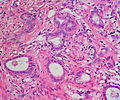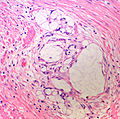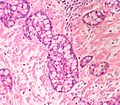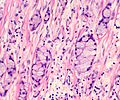Goblet cell adenocarcinoma
Jump to navigation
Jump to search
| Goblet cell adenocarcinoma | |
|---|---|
| Diagnosis in short | |
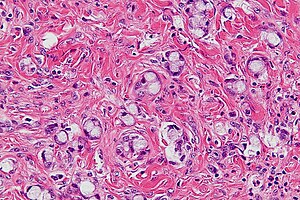 Goblet cell adenocarcinoma. H&E stain. | |
|
| |
| Synonyms | goblet cell carcinoid (obsolete term), crypt cell carcinoma |
|
| |
| LM | small clusters of cells with stippled chromatin and a goblet cell-like appearance |
| LM DDx | signet ring cell carcinoma, appendiceal neuroendocrine tumour, poorly differentiated adenocarcinoma |
| Stains | alcian blue +ve, PASD +ve, mucicarmine +ve |
| IHC | synaptophysin +ve, chromogranin +ve, S-100 +ve, CK20 +ve |
| Gross | usu. no mass apparent |
| Site | vermiform appendix, elsewhere in the GI tract |
|
| |
| Clinical history | "acute appendicitis" |
| Prevalence | rare |
| Prognosis | moderate |
| Clin. DDx | acute appendicitis, other appendiceal tumours, other abdominal pathology |
Goblet cell adenocarcinoma is a rare malignant tumour that is typically seen in the vermiform appendix.[1]
It has gone by a number of different names in the past: crypt cell carcinoma,[2] goblet cell carcinoid[3][4][5] and neuroendocrine tumour with goblet cell differentiation.
General
- Rare appendiceal tumour that typically has an aggressive course vis-à-vis appendiceal carcinoids.[4]
- Mixed (biphasic) tumour with endocrine and exocrine features.
- Usually presents as acute appendicitis.[5]
- Less common presentations: appendiceal mass, pain.
- Five year survival in one series: 60-85%.[5]
Gross
- Typically no mass is apparent at gross.[5]
Note:
- Should be submitted in total.
Microscopic
Features:[5]
- Mixed neuroendocrine-nonneuroendocrine tumour;[6] features of both carcinoid and adenocarcinoma.[5]
- Archictecture: cells arranged in nests or clusters without a lumen.
- Location: deep to the intestinal crypts (crypts of Lieberkühn); usually do not involve the mucosa.
- Cytoplasm distended with mucin.
- DNA: crescentic nucleus (similar to in signet ring cells).
- +/-Multi-nucleation.
- +/-High mitotic rate.
- Usually minimal nuclear atypia.
DDx:
- Appendiceal neuroendocrine tumour.
- Signet ring cell carcinoma[7] - cells more detached, no neuroendocrine differentiation.
- Poorly differentiated adenocarcinoma - see colorectal carcinoma.
Images
Case 1
Case 2
Stains
- Mucin stains +ve:
IHC
- Classic neuroendocrine markers:
- Synaptophysin +ve.
- Chromogranin +ve.
- S-100 +ve.
- NSE +ve.
- Serotonin +ve.
Keratins:
- CEA +ve (membrane).
Notes:
- Review of stains in Pahlavan and Kanthan.[5]
See also
References
- ↑ Kiyosawa N, Koyama M, Miyagawa Y, Kitazawa M, Tokumaru S, Soejima Y (April 2023). "Goblet cell adenocarcinoma of the appendix: A case report of three cases". Int J Surg Case Rep 106: 108229. doi:10.1016/j.ijscr.2023.108229. PMID 37084554.
- ↑ Limaiem F, Omrani S, Hajri M (January 2023). "Goblet cell adenocarcinoma of the ascending colon: An underrecognized diagnostic pitfall". Clin Case Rep 11 (1): e6822. doi:10.1002/ccr3.6822. PMC 9834544. PMID 36654693. https://www.ncbi.nlm.nih.gov/pmc/articles/PMC9834544/.
- ↑ Sigley K, Franklin M, Welch S (February 2021). "Appendiceal Goblet Cell Adenocarcinoma Case Report and Review of the Literature". Cureus 13 (2): e13511. doi:10.7759/cureus.13511. PMC 7992912. PMID 33786220. https://www.ncbi.nlm.nih.gov/pmc/articles/PMC7992912/.
- ↑ 4.0 4.1 van Eeden S, Offerhaus GJ, Hart AA, et al. (December 2007). "Goblet cell carcinoid of the appendix: a specific type of carcinoma". Histopathology 51 (6): 763–73. doi:10.1111/j.1365-2559.2007.02883.x. PMID 18042066.
- ↑ 5.0 5.1 5.2 5.3 5.4 5.5 5.6 Pahlavan, PS.; Kanthan, R. (Jun 2005). "Goblet cell carcinoid of the appendix.". World J Surg Oncol 3: 36. doi:10.1186/1477-7819-3-36. PMID 15967038.
- ↑ Volante M, Righi L, Asioli S, Bussolati G, Papotti M (August 2007). "Goblet cell carcinoids and other mixed neuroendocrine/nonneuroendocrine neoplasms". Virchows Arch. 451 Suppl 1: S61–9. doi:10.1007/s00428-007-0447-y. PMID 17684764.
- ↑ Pericleous, M.; Lumgair, H.; Baneke, A.; Morgan-Rowe, L.; E Caplin, M.; Luong, TV.; Thirlwell, C.; Gillmore, R. et al. (May 2012). "Appendiceal goblet cell carcinoid tumour: a case of unexpected lung metastasis.". Case Rep Oncol 5 (2): 332-8. doi:000339607. PMID 22933998.







